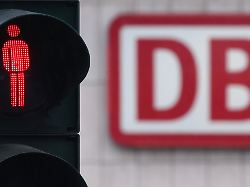Union: “bogus offer”
Strike still averted? EVG issues Bahn Ultimatum until 12 noon
05/12/2023, 09:07 am
The EVG has given Deutsche Bahn an ultimatum to avert the impending 50-hour strike. So far, this has not been possible because, from the union’s point of view, the railways have only submitted a “sham offer”.
For the time being, Deutsche Bahn has failed to avert the warning strike announced for Monday and Tuesday. According to her, there were talks with the railway and transport union (EVG) until late Thursday evening. Their chief negotiator, Kristian Loroch, spoke that night of “bogus offers” and explained that the warning strike would take place according to the current status. However, the union had given the railways an ultimatum to approach them “and to think things over” during the course of Friday, as Loroch said. “Deutsche Bahn has until today, 12 noon, to prevent the warning strike,” a union spokesman told the “Bild” newspaper on Friday morning.
The EVG had called on employees on Thursday for the third warning strike in the current collective bargaining round. The strike should last from 10 p.m. Sunday evening to 12 p.m. Tuesday evening. The railway decided to completely stop long-distance traffic during this time. Hardly any trains will run at DB Regio either. The so-called dispatchers, who coordinate daily rail traffic on the entire German rail network, are also called to the warning strike. Therefore, railway companies are affected that are not involved in the wage conflict. Freight traffic is also likely to come to a standstill.
From the point of view of Deutsche Bahn (DB), there is no longer any reason for the warning strike. “In intensive talks until late Thursday evening,” the EVG was promised to meet the demand it made months ago for the statutory minimum wage to be shown, the group announced around midnight. Around 2,000 employees have so far only been able to earn the minimum wage through bonuses. Overall, the EVG is negotiating for 180,000 employees at DB and a further 50,000 at other railway companies. “We have met the minimum wage requirement, now the EVG has its say,” emphasized DB HR Director Martin Seiler. “The EVG must now keep its promise and cancel the 50-hour warning strike.”
EVG negotiator Loroch spoke of a “bogus offer” by the railways. “In the end, after lengthy discussions, the employer put an option on the table that we considered worthy of discussion. After we started discussing it, he then backed down.”
Goods companies require emergency operation
The goods competitors asked Deutsche Bahn to organize an emergency operation. “The companies that are not in a collective bargaining conflict must not be harmed either intentionally or negligently,” says a letter from the network of European railways to the railway infrastructure division DB Netz. In view of a two-day warning strike on the rails, however, it is not to be expected that the German economy will be brought to its knees, according to the freight railway association. There are branches of industry that make time-critical calculations, such as the car or mineral oil industry. But even there the warning strike does not last long enough for serious effects.
The chairman of the Union of German Locomotive Drivers (GDL), Claus Weselsky, considers it unnecessary for the railways to stop long-distance traffic for 50 hours. “The EVG is not so well organized at the network subsidiary DB Netz that Deutsche Bahn would be forced to stop rail traffic,” Weselsky told the news portal “The Pioneer”. The smaller GDL competes with the EVG in the Bahn group for members and influence. Weselsky said: “I am sure that there will be no conclusion before we have made our demands.” The GDL is negotiating new collective agreements for the locomotive drivers and train staff organized by it from late summer. On June 5, the GDL wants to officially announce their demands.
Despite repeated warning strikes, interest in the Deutschlandticket continues. According to a survey, almost a third of the citizens want to buy it in the course of this year. Almost half (49 percent) of the 14 to 29 year olds want to buy the ticket, according to a survey by the consumer advice center. However, 30 percent of all respondents find the ticket too expensive. For 49 euros per month, you can use local and regional transport throughout Germany.
“We need a cheaper offer for people with low incomes. There must be a social graduation,” said Ramona Pop, board member at the Federal Association of Consumer Organizations. “The Deutschlandticket must also be attractive for families. A transferable family ticket must be offered and free transport of children up to the age of 14 must be regulated nationwide.” According to information from the industry, around seven million people have now subscribed to the new Deutschlandticket. These include around two million people who did not have a subscription for public transport before the introduction.
